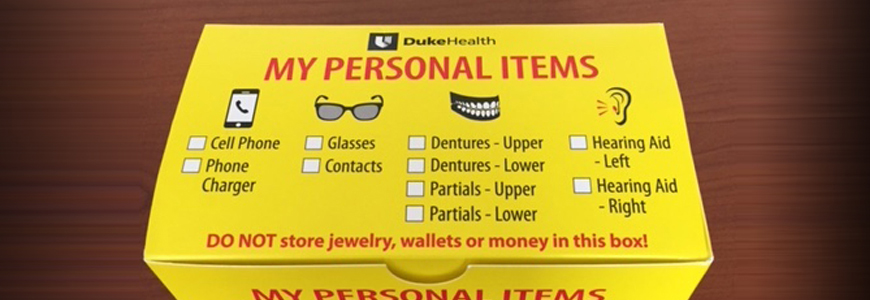Care teams at Duke hospitals are providing all senior patients two personal items to make their visits more comfortable, encourage engagement, and help prevent the delirium often associated with hospital visits.
A small, lightweight cabinet with drawers, known as a Care Square, offers puzzles, playing cards, and a listening device with age-specific music. An earbud-and-microphone combination is included to help patients with impaired hearing communicate.
The other item is a brightly colored box—dubbed the Yellow Box—that offers patients and families a visible, convenient location to store glasses, hearing aids, dentures, and other items that are often lost during hospital stays. The lid features a checklist to help patients record and remember personal items placed in the box.
Following a successful pilot project early in 2018, both the Yellow Box and Care Square have been offered to hundreds of senior patients across the Duke Health system since the summer.
Patients with Alzheimer’s disease benefit from the tactile experience of handling the small writing pads and puzzles in the Care Square, Orto says, which often minimizes the disorientation that many seniors experience during hospital stays.
Orto is a leader of the newly formed Duke Geriatrics Coordinating Council (GCC), which promoted the Yellow Box and Care Square roll-out. The GCC was created to develop an integrated, coordinated approach to the care of seniors across the Duke Health system. Other GCC leaders include Heidi K. White, MD, a geriatrician and vice chief of clinical affairs in the Division of Geriatrics, and William English, MSHA, MBA, administrative manager of the Health Optimization Program for Elders.
The Yellow Box and Care Square were identified by the council as “low-hanging fruit” that could be adopted quickly. “We have community representatives on the council who loved these ideas,” Orto says.
The council is the first such group at Duke to focus solely on the health of older adult patients, says White. “The Yellow Box and Care Square are the first examples of the council’s mission to develop an age-friendly health system."
